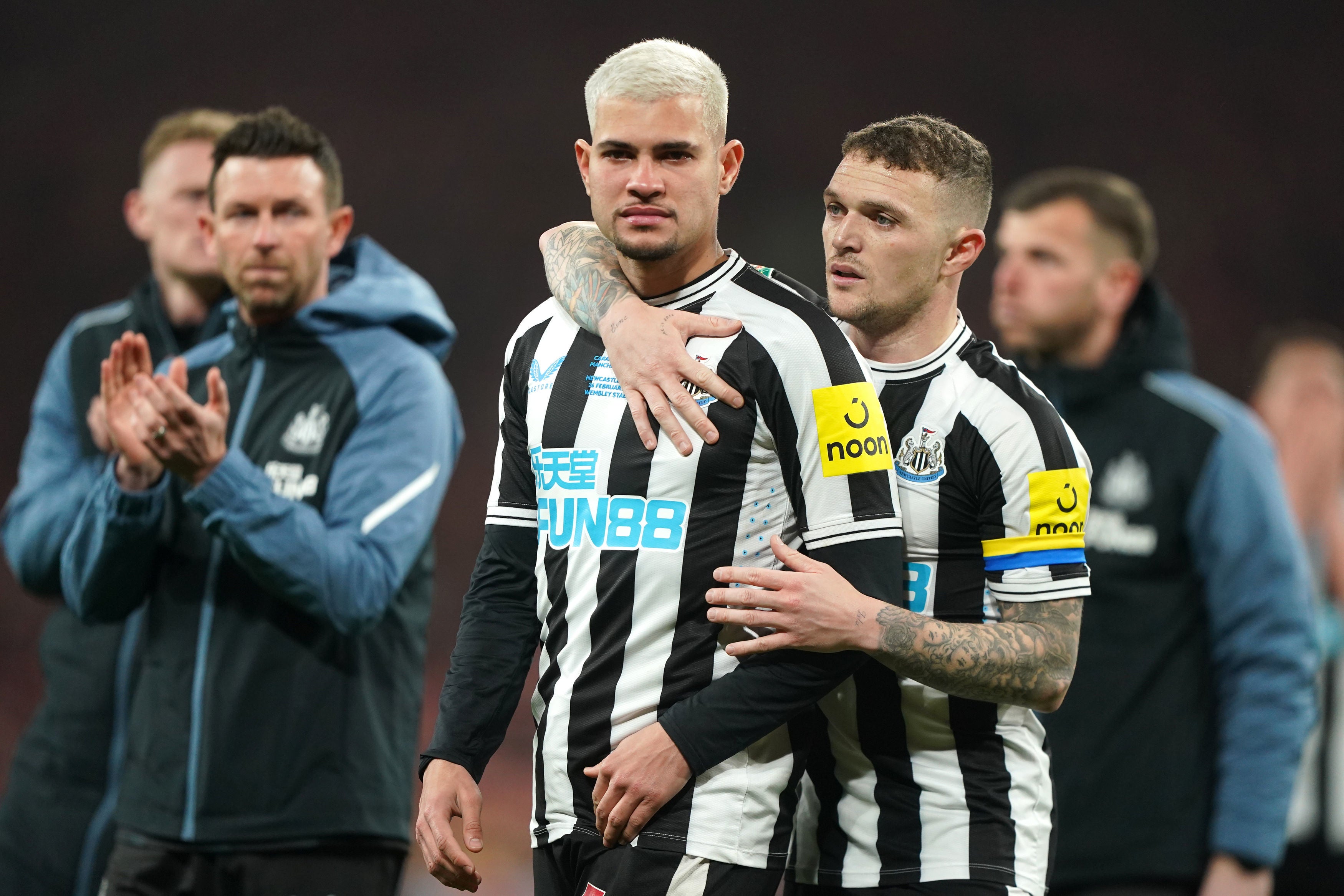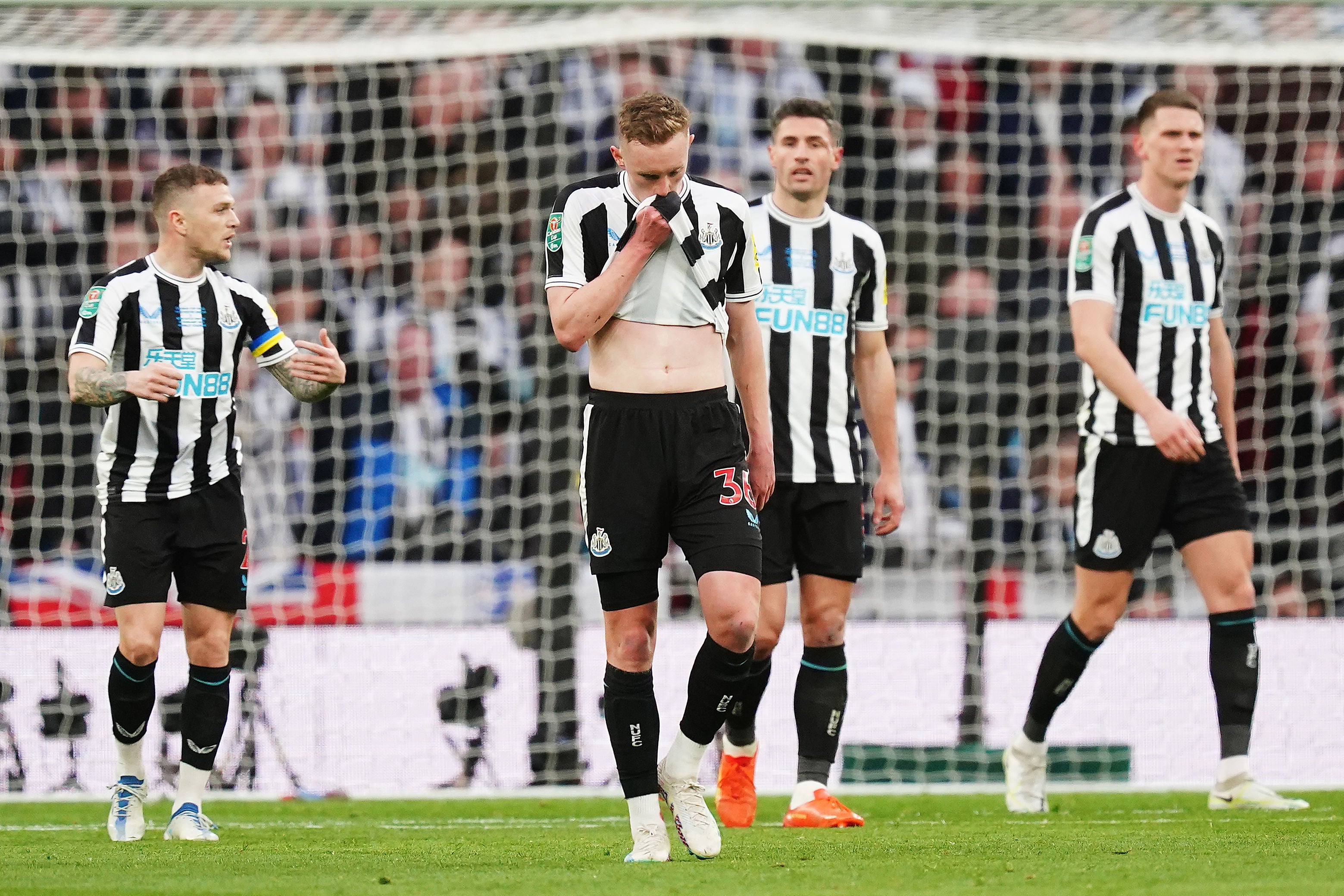
It was, to paraphrase Prince, a scoreline like it was 1999. It was Manchester United 2 Newcastle United 0 in a Wembley cup final, just as it had been when Sir Alex Ferguson got the second of his historic treble. Then, Newcastle’s wait for major silverware was a mere 30 years; now it is 54 and still more, 68, since they won anything at Wembley. Newcastle have had regime change, a transformation in the mood on Tyneside, their league form and expectations, but some things stay resolutely the same.
“We are desperate to get back here and win a trophy,” said Eddie Howe, the fifth Newcastle manager to lose a final since Joe Harvey prevailed in 1969. Two footballing realities collide, the sense that money always leads to success battling the notion Newcastle never win anything. It shouldn’t be another 24 years before a super-rich, ultra-ambitious Newcastle are in another final but Howe argued: “Nothing is guaranteed.” Certainly not for some of his team. “There will be some players that might not get back to Wembley,” he said. For Dan Burn, a graduate of the non-league, now in his thirties, the sort of player who could be sidelined for a glamorous upgrade, for Sean Longstaff, the local replaced at half-time, for Loris Karius, too, this might be it.
Each, in his own way, has offered a heartwarming story. Manchester United did not beat Newcastle because Nick Pope was suspended. After the trauma of his 2018 Champions League final, Karius was not merely blameless. The debutant excelled, making particularly fine stops from Wout Weghorst and Bruno Fernandes at the end of either half. “Some great saves,” said Howe. “He can be proud of his efforts.”

The sobering element for Newcastle is that defeat did not stem from a fourth-choice goalkeeper parachuted into a debut by a strange combination of circumstances. It came because, dramatic as the progress under Howe has been, despite the numbers showing they had more possession and more shots at Wembley, this underlined that there is still a sizeable gap that separates them from the best. Newcastle have bridged the first part, quicker than most expected and with greater contributions than anticipated from players of the ilk of Burn and Longstaff, Fabian Schar and Miguel Almiron, Joe Willock and Joelinton. The harder bit is still to come.
They lost to a goal by the serial Champions League winner Casemiro and one initially credited to Marcus Rashford, perhaps the form player in Europe. That can be the difference. “We were really good between both boxes but in the boxes, games are won and lost,” said Howe. His rhetoric tends to be realistic. He touched on broader issues. Newcastle were outstanding in their own penalty area for months but they are starting to concede. They have only scored three goals in their last seven league games.
There were echoes of last week’s loss to Liverpool: trailing 2-0 before the break, they again mounted a valiant effort without the sense they would actually stage a comeback. The greatest cause for optimism came off the bench. “When Alex came on he was electric,” said Howe and Alexander Isak, the club record signing, represents the untapped potential in the attack; perhaps he alone offers the prospect of more goals. Yet Almiron, the top scorer, has probably already had the scoring spurt of his life. Callum Wilson’s recent record stands at one goal in 13 games. Allan Saint-Maximin’s trickery resulted in Diogo Dalot’s half-time substitution and he offers the element of the unpredictable but he is an irregular scorer and, of all Newcastle’s attackers, he feels least a Howe player. But, since Almiron’s purple patch ended, Newcastle have lacked a formula for finding the net. “We are not as free-scoring as we were,” Howe said.

Newcastle have defended wonderfully this season but their goals against column felt artificially, unsustainably good. Take away the clean sheets – and Pope recently went 930 minutes without conceding – and the need to score two goals a game has increased. They have only done so three times in 16 outings.
In midfield, Bruno Guimaraes’ Wembley display was such a blend of substance and style to suggest he should be partnering Casemiro for Brazil. Yet his sidekicks lack similar artistry and he may need more excellence around him. For much of this season, it has seemed Newcastle’s workmanlike qualities could carry them into the Champions League.
Now it doesn’t. The second-most damaging 2-0 defeat of their day was suffered by Chelsea, giving Tottenham a four-point cushion in fourth. With Newcastle visiting Manchester City next weekend, it could soon be seven. After a mere two defeats all season, Newcastle have two in as many games. It could be three in three. Having taken up residence in the top four for months, they may instead have to ponder potential opponents in next season’s Europa or Conference Leagues.
Overachievers are getting dragged back. Newcastle have spent some £250m – particularly wisely on Kieran Trippier, Sven Botman, Guimaraes, Pope and Burn – but still only have perhaps the seventh-best squad. Financial Fair Play restrictions limit their ability to improve it.
Their wider problem is that, even though Manchester United were coming off a wretched 2021-22, Newcastle were still starting from a far lower base. They were the last team to win a game last season. They were doing a half-lap of honour at Wembley this year. “We were fighting relegation and in a battle to stay in the division,” Howe said. “This season was an unknown for us: would we step up and continue our momentum or would it be another season of struggle? The players have done incredibly well to elevate us to an incredible position but we are not the finished article.”
And, since Bobby Moncur lifted the 1969 Fairs Cup, finishing a season with silverware has been elusive. In 163 attempts, spread across various competitions, major trophies have continued to elude them. This side has come closer than most, but they are not the first to be so near to glory and yet so far from it.







